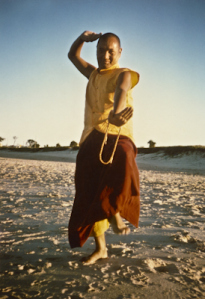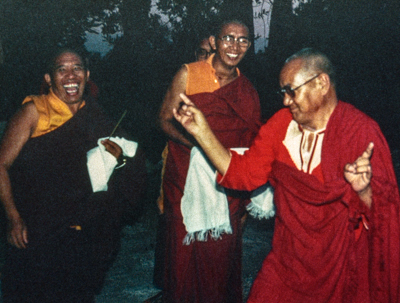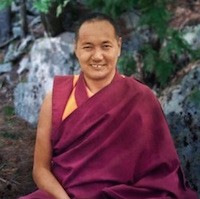From the Buddhist point of view, the human consciousness, or mind, is the source of all human activity.
Therefore, human beings can do all sorts of things, internal and external; human power is such that we can do anything.
We can put our energy into any direction we choose. That’s the power that humans have. The human mind is the source of all people’s happiness and unhappiness, and the Buddha’s teaching emphasizes the gaining of discriminating wisdom so that you can see the reality of your mental attitude and thereby direct your life and energy in the right direction towards tranquility and peace.
From the Buddhist point of view, basic human nature is beautiful, profound and clear. This is how you exist; it’s simply a matter of recognizing your own profound qualities and seeing that you have the potential for limitless development.
Meditation on the Four Immeasurables—limitless love, limitless compassion, limitless joy, and limitless equilibrium—indicate this. The reason that these four attitudes are called limitless is that fundamentally, we do have love, compassion, joy and equilibrium, but they are limited. We have love but it is limited love; we have compassion, but it is limited compassion; we have joyful appreciation of each other’s lives, but that joy is limited; we have a certain degree of equilibrium, but it too is limited.
What prevents us from realizing the Four Immeasurables is our ego—the ego mind. The view the ego mind perceives is wrong, partial. Therefore, our loving kindness is very narrow.
First, we have to recognize this in order to expand it. Look how we limit our enjoyment. Intellectually, our minds create the fabrication, “This object is my object of joy; I cannot enjoy the rest.” Such preconceptions cement our minds into fixed positions and are the result of our ego mind making mistaken judgments and placing limitations on our thought—“Only this object can bring me joy.” The purpose of practicing meditation on the four limitless qualities is to free ourselves from extreme, neurotic ego games. But don’t think, “Oh, now I understand that this is just an ego game–tomorrow I am going to give up ego games forever,” under the illusion that overnight you can change radically and that the next day your entire perspective on life will be completely different. That sort of change is impossible.
Powered by your ego mind, you have constantly been generating deluded energy since beginning less time; we can’t suddenly transform overnight simply by changing our intellectual ideas.

The way to overcome negative energy is to act with understanding and awareness day by day, every day.
That’s what makes it possible to change and transform our lives.
The reason we need meditation is that the ego game is extremely subtle and can function at the level of the unconscious. Detecting the activity of the ego game at the unconscious level is very difficult. We need great energy and strong penetrative insight to counteract the accumulated ego energy that has come from eons of repeated ego games. To reverse this energy force, we have to balance it. Therefore, it is not enough to merely think, “Now I understand that the ego is the problem; now I have understood” as a brief flash of insight. “Now I am liberated.
Today I have discovered my problem. This Buddhist philosopher monk has told me all about my ego. Now I’m liberated.”
You can’t do that; that’s dreaming.
What you have to do every day is to develop comprehension of your own attitude, your own mental activity, as much as you possibly can. This is a very important point. Today, for example, you’ve been playing and dancing. If you have inner awareness, you’ll see that your ego has been reacting in a certain way. One song is a favorite, another song you dislike; I am sure each of you has had this experience. When you dance, there are certain moves you like; you think they’re good; they make you happy.
There are other dance moves that you feel are stupid; no good. That’s the way you feel, and every time you dance, you’re reacting in your mind.
What Buddhist meditation allows you to do is to see that good dancing has value but so does bad. There’s nothing to react to emotionally. Also, the main reason I agreed to this festival, with its dancing, fun and games, was that I thought you could learn something, test and examine yourselves after doing the meditation course.

Each of us should check in: you’ve done many things today––have any of them really made you happy?
Ask yourself this question, right now: do you feel that what you’ve done today constitutes a really happy life? Exhausting yourself through singing and dancing—is the exhausted life a happy one?
This is very simple: your mind interprets, “Today is festival day; we’re happy. Today we’re going to get cake. We can give up morning meditation; nobody’s pushing us to meditate.” So you simply hang about, wandering aimlessly here and there, looking around. Do you think that’s happy? Some people will learn, “Dancing and cake are good, but they’re not the purpose of life.” In other words, you should not feel that being allowed to dance and do whatever you like is the definition of a really happy life. That’s a wrong attitude. However, you don’t have to be miserable, either. If you can interpret dancing as misery, similarly, you’ll think that sitting in meditation must also be miserable.
Buddhist philosophy teaches you to think logically; the Buddhist religion is a philosophical religion, a logical religion. Let’s say that you’ve been dancing for a while and suddenly stop. Your ego reacts, “Oh, now my pleasure has gone.” Many people’s ego will react like this, casting them into the same old darkness. They’re up, full of energy; suddenly the party finishes and they come back down. This up and down comes from ego, not understanding what is real happiness or the reality of life. All such activity has to change; nothing lasts.
Somehow you have to learn to let your pleasures go without grasping at them neurotically.
This is very important.
That’s why Buddhist philosophy teaches that the whole world is like an illusion–you cannot hold an illusion permanently; there is no solidity. What you enjoy from moment to moment cannot be held permanently. Its nature is impermanent, transitory; it passes, passes, goes, goes, finishes, finishes. That’s the whole reality of life. Therefore, it is very important to be aware of and accept that kind of reality, as it is. You can do it.
The Western ego suffers greatly because of the quickly changing nature of society.
When you find you cannot function because society is moving so quickly, you blame society. The nature of society is that it is going to change; it is your own nature to change; it’s the nature of weather to change. Therefore, it is very important that your attitude is such that you follow the middle path and avoid extremes.
But doing that is not an easy job; you need penetrative wisdom. That’s why we say meditation is worthwhile. Meditation does not mean going into a cave. Just contemplate the movement of your own actions—your breath, thoughts and everything else. That’s enough. Also, don’t think that you are irreversibly confused and unclear. That, too, is wrong.
Your mind has clarity; clarity is your mind’s ability to receive reflections of good and bad. Everybody has that, even children. When children play, they have some kind of discrimination. That is the beauty of their consciousness. You can contemplate on your ability to discriminate; that is the clarity of your mind. Contemplate on that. If you believe that you are confused all the time, of course, you’ll be confused.
Author: Lama Yeshe
Editor: Renée Picard
Images: courtesy of the author












Read 27 comments and reply